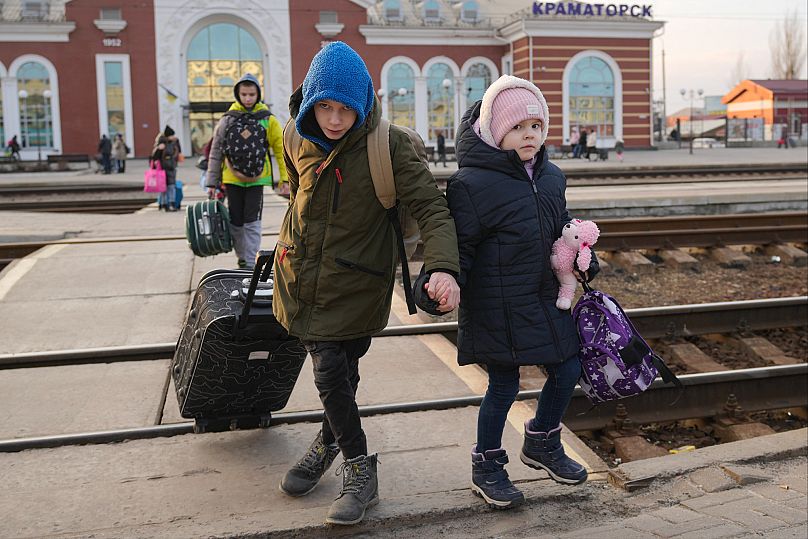Amidst war, Ukraine's adoption of the European Child Guarantee highlights its commitment to children's rights and offers critical insights into the EU's child protection efforts, Iryna Tuliakova writes for Euronews.
The European Child Guarantee is the European Union’s political and social response to one of the most systemic threats: child poverty and social exclusion.
It is based on the understanding that without children's access to education, healthcare, nutrition, family environment, and housing, our wider societies and the foundation of democracy as a whole are placed at risk.
For EU member states, this is already an established mechanism that is prioritised as a fundamental priority for a functioning nation, for Ukraine it is a mechanism that requires action amidst the challenges of war.
Ukraine, still at the stage of EU candidate status, has taken an exceptional step: voluntarily joining this framework.
What marks this as a seminal moment is that this decision was made during a time of war, when millions of children have lost their homes, access to education, family care, and the safety which so many nations enjoy so freely.
This decision from Ukraine sends a signal both to Ukrainian society and European partners that children’s rights are not secondary, even in times of national crisis. It reflects another foundation stone on Ukraine’s path to recovery.
Ukraine’s adoption also brings some critical experience to the European framework, particularly in light of the approximately 1.6 million Ukrainian children who remain in the Russian Federation and in temporarily occupied territories of Ukraine under Russian control.
The efforts of Ukraine and EU member states to return these children strike at the very heart of what the European Child Guarantee stands for. These children epitomise the reason the guarantee is revered by all EU member states and remains a critical tool for the protection of children.
With Ukraine’s alignment, the lessons of these stolen children and the tools needed to rehabilitate them into a sense of normality become more apparent. While the EU is providing the structure of alignment that Ukraine seeks, it is Ukraine that can provide the expertise and experience that can ensure this Guarantee evolves over the decades to come.
Each component of the European Child Guarantee holds a concrete meaning in Ukraine. In a country where a significant share of children live in communities with limited access to services, an issue only exacerbated by the constant attacks from Russian forces, it serves as a critical tool to redevelop Ukraine into the nation it has the potential to be.
The challenges of adhering to the European Child Guarantee are never more apparent than in frontline areas, where the need for shelters, buses to transport children, and basic digital tools that make it possible to continue learning even under emergency conditions, come with major existential risks.
Supporting the education, health and development of children in these environments of war is generating a systematic response for those suffering trauma.
Many of the objectives of the European Child Guarantee in the context of Ukraine are not only social but also humanitarian. Housing placement is yet another element that may seem obvious for peaceful countries, but is a challenge for Ukraine in the context of mass displacement and the indiscriminate destruction of communities. These conditions create almost impossible challenges for delivering the resources required.
Finally, ensuring guarantees for children requires systematic data collection, the introduction of a new model for social services, and strengthening the capabilities of child-protection services.
Ukraine is taking steps that could serve as examples for others: digitalising adoption and child-placement processes, building a network to work with child victims of violence, and developing juvenile justice.
European Child Guarantee is a choice of values
In all this, the EU gains a unique partner that will test the Guarantee Framework under extraordinarily difficult conditions. This creates unprecedented experience that can enrich European practice and provide answers to questions faced by the EU itself: how to protect children’s rights in crises, how to build resilient systems under conditions of destruction, and how to integrate humanitarian measures with long-term social policy.
For the EU, it is also a matter of stability at its borders. By investing in Ukraine’s children, the EU is investing in its own security and future.
A country where children have access to education, healthcare, housing, and protection is a country capable of recovering, integrating into the European space, and becoming a full participant in common policy. In this sense, the European Child Guarantee becomes not only a social but also a geopolitical framework.
For Ukraine, the European Child Guarantee is more than an instrument of social policy. It is a choice of values that we place at the foundation of rebuilding. The war has taught us that the strength of a state is measured not only by its army or economy but also by how well its children are protected.
Strong and resilient Ukraine begins with every child who has safety, support, opportunities for development and confidence in tomorrow. That is why the European Child Guarantee is not only a framework for EU integration but also a roadmap for our national recovery.
Iryna Tuliakova is the head of the Coordination Centre for Family Upbringing and Child Care Development, the Ukrainian government's focal point for implementing the European Child Guarantee, and the coordinator of the European Child Guarantee in Ukraine.












